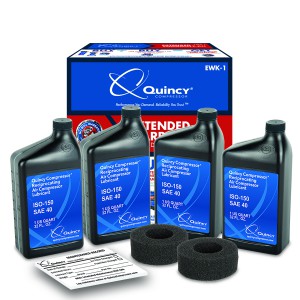 Reciprocating/piston air compressors are complex machines with many moving parts. Regular maintenance is essential for ensuring all compressor parts and components function at peak efficiency as well as for preventing wear that can ultimately lead to premature failure. The following tips can serve as guide for safe, reliable and economical reciprocating compressor operation and maintenance.
Reciprocating/piston air compressors are complex machines with many moving parts. Regular maintenance is essential for ensuring all compressor parts and components function at peak efficiency as well as for preventing wear that can ultimately lead to premature failure. The following tips can serve as guide for safe, reliable and economical reciprocating compressor operation and maintenance.
Keeping the Compressor Clean
Excess dirt and debris is a major cause of premature compressor failure. Compressor operators play an important role in the preventive maintenance process by watching for the accumulation of dirt during use and removing it as quickly as possible.
Minimizing Vibrations
Vibration is a common issue that can lead to reciprocating compressor failure. Vibration is typically a result of the compressor not being properly secured. Constant vibration will eventually cause compressor parts and components to loosen, leading to parts misalignment, excessive wear on the bearings and other more serious mechanical problems.
Changes in Temperature
A sudden spike in temperature during operation is a sign that a compressor is running too hot. If the operator is unable to regulate the temperature, the compressor should be shut down immediately, as running it at high temperatures for an extended period of time will most certainly lead to equipment failure.
Proper Piston Compressor Lubrication
The failure to properly lubricate a piston compressor will lead to the development of friction that causes parts to wear down. In general, piston compressor lubrication entails the compressor frame, which includes the connecting rod, crosshead, motor and main bearings. It also encompasses the cylinders, including the valves, compression rings, rider bands and packing.
The best type of reciprocating air compressor oil and appropriate oil viscosity to use for lubrication depends on factors such as the type of gas that is being compressed and the desired discharge pressure. In terms of crankcase oils, the recommended ISO viscosity grade is 68, 100, 150 or 200, which can vary based on the ambient temperature. In operating conditions where discharge temperatures reach between 302°F and 392°F, a synthetic oil of an equivalent viscosity grade should be used.
Our Testimonials
Piston Compressor Oil Maintenance
When to add or change reciprocating air compressor oil will depend on factors such as the model type and operating conditions. In general, manufacturers recommend changing the oil on a quarterly basis, but more often with greater use. The operator should also regularly monitor the fluid level and add oil as necessary.
Quincy offers a range of proprietary blends especially formulated for the rigors of piston compressors:
- Synthetic Quin-Cip® D SAE-100 30W
- Quin-Cip® SAE 10 Weight ISO-32
- Quin-Cip® SAE 20 Weight ISO-68
- Quin-Cip® SAE 40W ISO-150
Contact Quincy for More Reciprocating Compressor Operation and Maintenance Advice
With nearly a century of air compressor manufacturing experience, Quincy Compressor offers reliable expert tips and advice regarding reciprocating compressor operation and maintenance. Feel free to contact us directly or get in touch with the authorized Quincy distributor in your local area.

